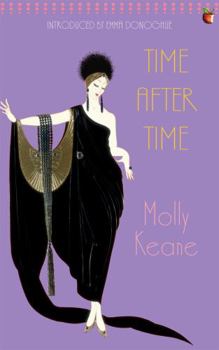Time After Time
Select Format
Select Condition 
Book Overview
FROM THE AUTHOR SHORTLISTED FOR THE MAN BOOKER PRIZE
Format:Paperback
Language:English
ISBN:1844083276
ISBN13:9781844083275
Release Date:June 2006
Publisher:Virago Press (UK)
Length:256 Pages
Weight:0.50 lbs.
Dimensions:0.7" x 5.0" x 7.8"
Customer Reviews
3 ratings
Dark humor in the manor house.
Published by Thriftbooks.com User , 16 years ago
This book belongs to a very specific genre - that of the shabby-genteel, slightly eccentric, Anglo-Irish family, still living in the manor house, which is now crumbling around them, as they struggle to keep up appearances, and spend a significant amount of time living in the past. Manor house novels are Keane's stock in trade - over the span of her career (writing as M.J. Farrell) she has joined other writers such as Elizabeth Bowen, Joyce Cary, Jennifer Johnston and William Trevor in documenting the behavior and mores of the declining Irish Protestant Ascendancy. Conflicted loyalties, class resentment, and nostalgia for a dying way of life are common themes in this particular branch of Anglo-Irish literature and each surfaces to some extent in "Time After Time". Given that it was written when Keane was 80, it's not too surprising that nostalgia for the past looms large throughout the book. Keane's novels are generally light-hearted, more driven by character than by plot, and this one is no exception. I enjoyed this book for the virtues it shares with her previous work - she documents her characters' foibles and eccentricities with a clear eye, but also with genuine wit and obvious affection. So this is a fun book, though don't look for profundity. And while Keane is a talented writer, William Trevor remains the undisputed master of the genre.
"I just wish I was more of a Human Being."
Published by Thriftbooks.com User , 19 years ago
The cruelties of life, both deliberate and accidental, play out with delicious irony in this very dark precursor to the modern noir novel. An elderly brother and his three aging sisters, all physically and emotionally maimed, are required, under the terms of their mother's will, to share the rapidly deteriorating family estate, Durraghglass, near Cork, Ireland. April, the only sister who ever married, is totally deaf but refuses to acknowledge it. May, with a grossly deformed hand, compensates by making "artistic" pictures out of scraps of tweed--and by incidental shop-lifting. June, severely dyslexic, actively manages the "farm." Jasper, blinded in one eye by June in a childhood accident, runs the moldy kitchen and makes gourmet meals out of scraps, sometimes even borrowing from the dogs' meals to improve meals for the family. Each of the Swift family members, firmly controlled by "Mummie" and her memory, leads an almost totally isolated, secret-filled life, unable to share feelings or care for anyone else.Their already precarious lives are tested with the unexpected arrival of Leda, a formerly glamorous, half-Jewish cousin from Austria, whom they all thought "perished in some cold, unnamed camp, most likely. Who wants sordid details?" Leda, once April's best friend, bears grudges that hark back to her teen years, when her closeness to the family was deemed threatening to April's mother and she was summarily removed from Durraghglass, never to return. With subtlety and cleverness, author Keane slowly reveals elements of Leda's background and her connections to the family, using the dialogue, often at cross-purposes and always mordantly humorous, to reveal information, motivation, and character simultaneously. Irony builds upon irony as Leda's actions and remarks, often misunderstood, succeed in turning one sibling against another.The myth of Leda and the Swan plays constantly in the background, with numerous symbolic references to the swans on the pond at Durraghglass and to Leda's swan-like preening. The Swifts, to continue the bird imagery, are no competition for Leda. As the tension of this domestic drama ratchets up and Leda wreaks her havoc, fate has a few ironies left in store. Unexpected resolutions, equivalent to those of a Greek tragedy, bring the novel to a wickedly satisfying close. Mary Whipple
A funny, yet compassionate view of an old family
Published by Thriftbooks.com User , 24 years ago
This is the very funny story of three sisters and their brother, living in a once opulent and now dilapidated country house in Ireland. Molly Keane has an amazing ability for dissecting the numerous weaknesses of these eccentric characters, always with irony, love and sympathy. As in some other of her novels, she deals with the issue of power in the relationship of care givers and care receivers, showing that even at its most unselfish and needed, taking care of someone can be the ultimate revenge.





